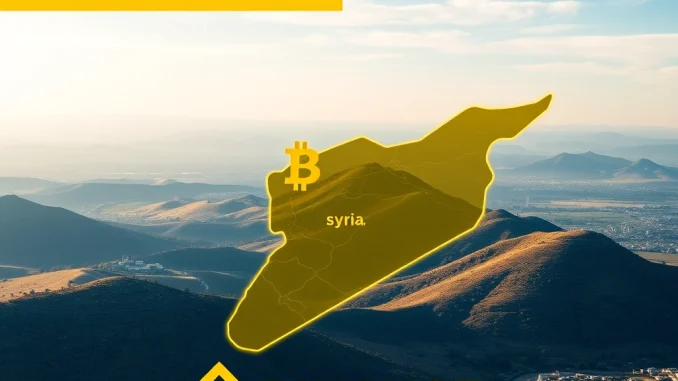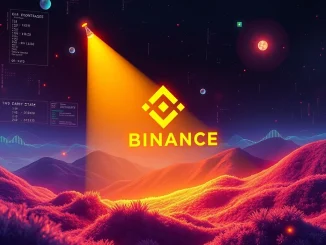
In a significant development for the cryptocurrency landscape, particularly within the Middle East, global crypto exchange giant Binance has announced a major policy shift. For the first time in years, residents of Syria can now access and utilize the full suite of products and services offered by the platform. This move marks a historic moment, unlocking potential financial avenues for individuals in a region long impacted by stringent economic restrictions. The ability to gain **Binance Syria access** is a direct result of recent adjustments to U.S. sanctions policy, signaling a changing environment for international financial interactions.
Understanding the **Binance Syria Access** Development
The core of this news lies in an official update from Binance itself. The exchange confirmed via its website that Syria is no longer listed as a restricted country within its Terms of Use. Previously, individuals residing in Syria faced significant barriers, if not outright prohibition, from opening accounts or using services on major international platforms like Binance due to various sanctions and compliance requirements.
This change means that the digital doors are now open. Syrian residents who can complete the necessary identity verification (KYC – Know Your Customer) procedures will be able to register accounts and engage with the platform just like users in most other countries. This is a pivotal moment, transforming the possibilities for financial engagement in the digital asset space for many.
What Does This Mean for **Crypto in Syria**?
The impact of this announcement on **Crypto in Syria** is potentially transformative. With access to the world’s largest cryptocurrency exchange by trading volume, Syrian residents gain entry to a wide array of services that were previously out of reach. This includes:
- Spot Trading: Buying and selling a vast selection of cryptocurrencies.
- Futures and Derivatives: Engaging in more complex trading strategies (availability may depend on specific user verification levels and local regulations).
- Earn Products: Opportunities to earn passive income through staking, savings, and other yield-generating products.
- NFT Marketplace: Access to the growing world of Non-Fungible Tokens.
- Fiat Gateways: Depending on regional partnerships, potential avenues to convert local currency to crypto and vice-versa (though this can still be challenging in sanctioned environments).
This access provides alternative financial tools in an economy often facing currency volatility and limited traditional banking options. It can facilitate remittances, offer inflation hedges, and open up global investment opportunities in digital assets.
The Context: Navigating **Binance Sanctions** and Compliance
Major global platforms like Binance operate under complex international regulatory frameworks, including sanctions imposed by countries like the United States and entities like the European Union. These sanctions are designed to restrict financial flows to certain countries, individuals, or entities for various geopolitical reasons.
Binance, as a global entity, must adhere to these regulations. The fact that they have now opened access to Syria indicates that their compliance team has assessed the recent changes in U.S. sanctions policy and determined that providing services to Syrian residents is now permissible under these updated rules. This highlights the dynamic nature of **Binance sanctions** compliance, which requires continuous monitoring and adaptation to evolving international law.
It’s crucial to understand that while U.S. federal sanctions policy has changed regarding Syria in ways that allow this access, other restrictions or specific entity sanctions might still apply. Furthermore, users must still comply with Binance’s internal KYC/AML (Anti-Money Laundering) policies, which are often rigorous.
Why **Syria Crypto Exchange** Options Were Limited Before
Prior to this announcement, finding a reliable and internationally connected **Syria crypto exchange** was exceedingly difficult. Most major global exchanges restricted access to the country due to the prevailing sanctions regime. This left Syrian residents with limited options, often relying on smaller, less liquid, or potentially less secure local peer-to-peer networks or grey-market channels to acquire or trade digital assets.
The lack of access to regulated, high-volume exchanges like Binance meant higher costs, lower security, and limited access to the broader crypto ecosystem (altcoins, DeFi, NFTs, etc.). This move by Binance significantly changes that landscape, providing a direct, albeit regulated, pathway to the global crypto market.
Navigating **Binance Restricted Countries**: What Comes Next?
While gaining access is a massive step, Syrian users may still face challenges. Funding accounts can be difficult due to limited international banking connectivity. Understanding and complying with Binance’s full terms and verification requirements will be essential. Users should also be aware of any potential local regulations or restrictions within Syria regarding cryptocurrency use.
This development with Syria also offers insight into how changes in international policy can impact access to financial technology in regions facing sanctions. As policies evolve, we may see similar shifts regarding access for residents in other countries currently listed among **Binance restricted countries**, assuming those restrictions are tied to external sanctions that are later modified.
For Syrian residents interested in using Binance, the actionable insight is clear: visit the official Binance website, review the updated Terms of Use, and prepare for the necessary identity verification process. Start by understanding the basics of cryptocurrency and how the platform works before committing significant funds.
Conclusion
The announcement that Binance is opening its platform to residents of Syria is a landmark event. Fueled by changes in U.S. sanctions policy, this decision provides millions of people with potential access to the global cryptocurrency market and the opportunities it presents. While challenges remain, the ability to gain **Binance Syria access** represents a significant step towards greater financial inclusion and marks a notable shift in how major crypto platforms navigate complex international regulations. It will be fascinating to observe the impact of this development on the adoption and use of **Crypto in Syria** in the months and years ahead.



